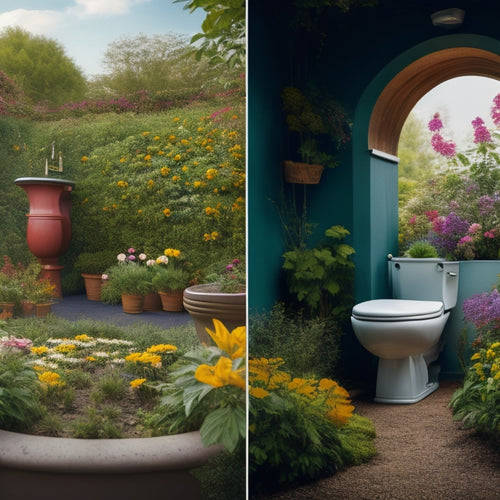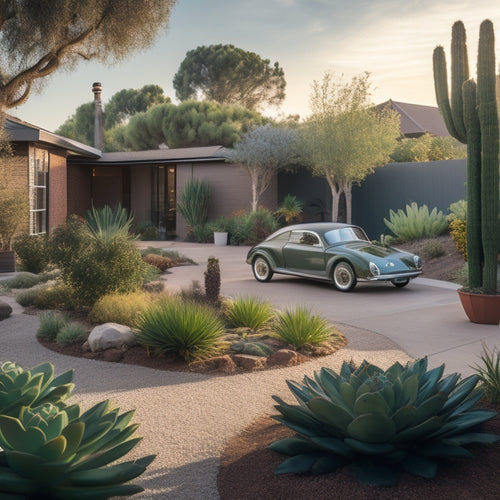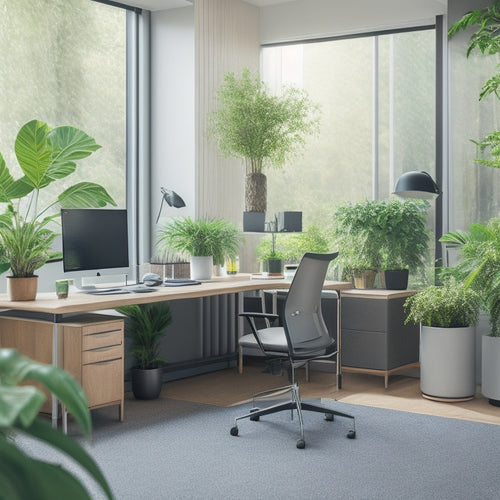
Eco-Friendly Cooling: Beyond Traditional Air Conditioning Systems
Share
As you look beyond traditional air conditioning systems, you'll find a range of eco-friendly cooling solutions that can greatly reduce your carbon footprint. From smart thermostats that learn your temperature preferences to HVAC optimization strategies that identify inefficiencies, there are numerous ways to cut energy consumption. Emerging green cooling technologies, such as evaporative cooling and radiative cooling, offer sustainable alternatives to traditional AC systems. By incorporating passive design strategies, natural ventilation techniques, and renewable energy solutions, you can create a more sustainable living environment. By exploring these innovative approaches, you'll reveal even more opportunities to optimize your eco-friendly cooling system.
Key Takeaways
- Smart thermostats learn temperature preferences and optimize cooling schedules for reduced energy consumption and carbon footprint.
- HVAC optimization conducts energy audits, prioritizes upgrades, and implements zoning systems for maximum efficiency and long-term savings.
- Emerging green cooling technologies include sustainable solutions like solar-powered EV charging, evaporative cooling, and radiative cooling.
- Alternative cooling methods, such as evaporative coolers, thermal mass, and shading devices, provide energy-efficient and eco-friendly alternatives.
- Sustainable home cooling strategies incorporate passive design, renewable energy, natural ventilation, and reflective materials for a reduced reliance on traditional AC systems.
Smart Thermostats for Energy Savings
You can considerably reduce your energy consumption by installing a smart thermostat, which learns your temperature preferences and adjusts the cooling system accordingly.
This advanced technology allows for smart scheduling, ensuring your home is cooled only when needed. Additionally, it provides real-time energy monitoring, giving you a clear depiction of your energy usage.
By integrating renewable energy sources, such as solar energy, into your cooling system, you can further minimize your carbon footprint.
By analyzing this data, you can identify areas for improvement and make informed decisions to optimize your cooling system.
With a smart thermostat, you're in control, making it an essential component of an eco-friendly cooling system that promotes freedom from excessive energy waste.
HVAC Optimization for Maximum Efficiency
In conjunction with smart thermostats, optimizing your heating, ventilation, and air conditioning (HVAC) system is essential for achieving maximum efficiency in your eco-friendly cooling setup.
You'll want to identify areas of improvement through energy audits, which pinpoint energy-wasting habits and inefficiencies. Based on the audit results, you can prioritize system upgrades that will have the greatest impact.
Additionally, considering the long-term savings of electric vehicles, which can save up to $14,500 on fuel costs over 15 years electric vehicle costs, can also inspire similar cost-effective decisions for your HVAC system.
Upgrading to high-efficiency equipment, sealing duct leaks, and adding insulation can greatly reduce energy consumption.
Additionally, consider zoning systems, which allow you to control temperature and airflow in individual areas, reducing waste and increasing overall efficiency.
Green Cooling Technologies Emerging
As HVAC optimization reaches its peak, innovative green cooling technologies are emerging to further revolutionize the eco-friendly cooling environment.
You're now witnessing the rise of state-of-the-art solutions that prioritize sustainability and energy efficiency. As the transportation sector shifts towards electric vehicles, solar-powered EV charging is becoming a vital aspect of reducing carbon footprint.
One such technology is passive cooling, which utilizes natural ventilation and insulation to reduce the need for mechanical cooling systems.
Evaporative cooling is another promising area, using water evaporation to cool the air without relying on refrigerants.
These green cooling technologies are ready to disrupt the traditional air conditioning market, offering you a cleaner, more efficient way to stay cool.
Alternative Cooling Methods Explained
Passive cooling systems employ the power of natural ventilation and insulation to minimize the need for mechanical cooling, effectively reducing energy consumption. You can investigate alternative cooling methods that work in harmony with the environment.
| Cooling Method | How it Works | Benefits |
|---|---|---|
| Evaporative Coolers | Use water evaporation to cool air | Energy-efficient, low maintenance |
| Thermal Mass | Absorbs heat during the day, releases at night | Reduces temperature fluctuations |
| Radiative Cooling | Emits heat into space | Zero energy consumption, passive |
| Shading Devices | Blocks direct sunlight | Reduces heat gain, improves comfort |
| Ventilation Systems | employs natural airflow | Improves air quality, reduces energy use |
These alternative cooling methods can be integrated into your living space to reduce your reliance on traditional air conditioning systems, giving you the freedom to live more sustainably.
Sustainable Home Cooling Strategies
Your home can be a haven of cool comfort without relying on energy-guzzling air conditioning units. By incorporating sustainable home cooling strategies, you can reduce your energy consumption and carbon footprint.
One approach is passive design, which involves optimizing your home's layout and orientation to maximize natural cooling. This can include features like large overhangs, shading devices, and reflective roofing materials.
Additionally, incorporating renewable energy solutions like solar panels and green hydrogen fuel cells can provide a reliable source of power for your cooling needs.
Natural ventilation is another key strategy, where you use cross-ventilation, clerestory windows, and whole-house fans to circulate cool air and expel hot air.
Frequently Asked Questions
Can I Retrofit My Existing AC System for Eco-Friendliness?
You can investigate retrofit options for your existing AC system to enhance energy efficiency, such as upgrading to an inverter-driven compressor or adding an evaporative cooling system, which can reduce your carbon footprint and energy bills.
How Do I Choose the Right Eco-Friendly Cooling System for My Climate?
When selecting an eco-friendly cooling system, you'll want to take into account your climate's unique needs, incorporating passive cooling strategies and making seasonal adjustments to optimize performance, ensuring a harmonious balance between comfort and environmental freedom.
Are Eco-Friendly Cooling Systems More Expensive Upfront?
You'll find that eco-friendly cooling systems often come with a higher upfront cost, but don't let that deter you - a thorough cost comparison will reveal significant long-term savings, giving you the freedom to reap the benefits of a sustainable investment.
Can I Fully Eliminate Traditional AC in My Home?
Imagine waking up to a naturally cool home, sans AC hum. You can fully eliminate traditional AC by leveraging passive cooling techniques, like strategic shading and insulation, to enhance energy efficiency, and embracing innovative solutions that liberate you from fossil fuels.
Do Eco-Friendly Cooling Systems Require More Maintenance?
You'll find that eco-friendly cooling systems often require more frequent maintenance checks, but this trade-off can lead to longer system longevity, ultimately giving you more freedom from costly repairs and replacements down the line.
Related Posts
-

Why Transform Human Waste Into Garden Gold?
By changing human waste into garden gold, you'll reduce waste management costs, support sustainable agriculture, and ...
-

What Water-Saving Gardens Complement Electric Vehicle Ownership?
As you pair your electric vehicle with a water-saving garden, you're not only reducing your carbon footprint but also...
-

What Air Purifiers Save Energy in Work Areas?
You can cut energy costs and reduce your carbon footprint by choosing air purifiers designed with energy efficiency i...


